 W
WProject Hula was a program during World War II in which the United States transferred naval vessels to the Soviet Union in anticipation of the Soviets eventually joining the war against Japan, specifically in preparation for planned Soviet invasions of southern Sakhalin and the Kuril islands. Based at Cold Bay in the Territory of Alaska, the project was active during the spring and summer of 1945. It was the largest and most ambitious transfer program of World War II.
 W
WThe Admirable class was one of the largest and most successful classes of minesweepers ordered by the United States Navy during World War II. Typically, minesweepers detected and removed naval mines before the rest of the fleet arrived, thereby ensuring safe passage for the larger ships. They were also charged with anti-submarine warfare (ASW) duties with rear-mounted depth charge racks and a forward-firing Hedgehog antisubmarine mortar. Their job was essential to the safety and success of U.S. naval operations during World War II and the Korean War. These minesweepers were also employed as patrol vessel and convoy escorts.
 W
WAuxiliary motor minesweepers were small wood-hulled minesweepers commissioned by the United States Navy for service during World War II. The vessels were numbered, but unnamed. The auxiliary motor minesweepers were originally designated yard minesweepers (YMS) and kept the abbreviation YMS after being re-designated. The type proved successful and eventually became the basis for the AMS type of United States Navy minesweeper.
 W
WThe Landing Craft Infantry (LCI) were several classes of seagoing amphibious assault ships of the Second World War used to land large numbers of infantry directly onto beaches. They were developed in response to a British request for a vessel capable of carrying and landing substantially more troops than their smaller Landing Craft Assault (LCA). The result was a small steel ship that could land 200 men, traveling from rear bases on its own bottom at a speed of up to 15 knots.
 W
WA submarine chaser is a small and fast naval vessel that is specifically intended for anti-submarine warfare. Many of the American submarine chasers used in World War I found their way to Allied nations by way of Lend-Lease in World War II.
 W
WThe Tacoma class of patrol frigates served in the United States Navy during World War II and the Korean War. Originally classified as gunboats (PG), they were reclassified as patrol frigates (PF) on 15 April 1943. The class is named for its lead ship, Tacoma, a Maritime Commission (MARCOM) S2-S2-AQ1 design, which in turn was named for the city of Tacoma, Washington. Twenty-one ships were transferred to the British Royal Navy, in which they were known as Colony-class frigates, and twenty-eight ships were transferred under Lend-Lease to the Soviet Navy, where they were designated as storozhevoi korabl, during World War II. All Tacoma-class ships in US service during World War II were manned by United States Coast Guard crews. Tacoma-class ships were transferred to the United States Coast Guard and various navies post-World War II.
 W
WUSS Admirable (AM-136) was the lead ship of her class of minesweeper built for the United States Navy during World War II. In commission from 1943 to 1945, she was transferred to the Soviet Navy in 1945 and served as T-331 until stricken in 1958.
 W
WUSS Albuquerque (PG-115/PF-7), a Tacoma-class patrol frigate in commission from 1943 to 1945 and from 1950 to 1953, was the first ship of the United States Navy to be named for Albuquerque, New Mexico. She also served in the Soviet Navy as EK-14 and in the Japan Maritime Self-Defense Force as JDS Tochi (PF-16/PF-296) and as YAC-15.
 W
WUSS Allentown (PF-52), a United States Navy Tacoma-class frigate in commission from 1944 to 1945, has thus far been the only U.S. Navy ship to be named for Allentown, Pennsylvania. She later served in the Soviet Navy as EK-9 and in the Japan Maritime Self-Defense Force as JDS Ume (PF-9), JDS Ume (PF-289) and as YAC-14.
 W
WUSS Bayonne (PF-21), a Tacoma-class frigate in commission in 1945 and from 1950 to 1953, thus far has been the only ship of the United States Navy to be named for Bayonne, New Jersey. She later served in the Soviet Navy as EK-25 and in the Japan Maritime Self-Defense Force as JDS Buna (PF-14), JDS Buna (PF-294) and as YAC-11.
 W
WUSS Bisbee (PF-46) was a United States Navy Tacoma-class frigate in commission from 1944 to 1945 and from 1950 to 1951. She also served in the Soviet Navy as EK-17 and in the Colombian National Armada as ARC Capitán Tono.
 W
WUSS Burlington (PF-51) was a Tacoma-class frigate in commission from 1944 to 1945 and from 1951 to 1952, the only United States Navy ship thus far to have been named for Burlington, Iowa. She also served in the Soviet Navy as EK-21 and in the Colombian National Armada as ARC Almirante Brión .
 W
WUSS Carson City (PF-50), a Tacoma-class frigate in commission from 1944 to 1945, thus far has been the only ship of the United States Navy to be named for Carson City, Nevada. She later served in the Soviet Navy as EK-20 and in the Japan Maritime Self-Defense Force as JDS Sakura (PF-10), JDS Sakura (PF-290) and as YAC-16.
 W
WUSS Charlottesville (PF-25), a United States Navy Tacoma-class frigate in commission from 1944 to 1945, has been the only US Navy ship thus far to be named for Charlottesville, Virginia. She later served in the Soviet Navy as EK-1 and in the Japan Maritime Self-Defense Force as JDS Matsu (PF-6), JDS Matsu (PF-286) and YAS-36.
 W
WUSS Coronado (PG-146/PF-38), a Tacoma-class frigate, was the first ship of the United States Navy named for Coronado, California, a city adjacent to Naval Air Station North Island in San Diego. After World War II service in the U.S. Navy, she served in the Soviet Navy as EK-8 and later in the Japan Maritime Self-Defense Force as Sugi (PF-5) and Sugi (PF-285).
 W
WUSS Disdain (AM-222) was an Admirable-class minesweeper built for the United States Navy during World War II and in commission from 1944 to 1945. She was transferred to the Soviet Union in 1945 and after that served in the Soviet Navy as T-271.
 W
WUSS Everett (PG-116/PF-8), a Tacoma-class patrol frigate in commission from 1944 to 1945 and from 1950 to 1953, thus far has been the only ship of the United States Navy to be named for Everett, Washington. She also served in the Soviet Navy as EK-15 and in the Japan Maritime Self-Defense Force as JDS Kiri (PF-11/PF-291/YAC-20).
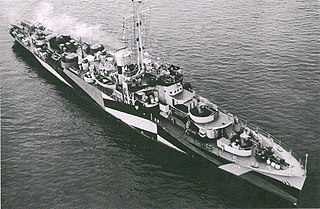 W
WThe second USS Gallup (PF-47), a Tacoma-class frigate in commission from 1944 to 1945 and from 1950 to 1951, was the first ship of the United States Navy to be named for Gallup, New Mexico. She also served in the Soviet Navy as EK-22 and in the Royal Thai Navy as HTMS Prasae .
 W
WUSS Glendale (PF-36), a Tacoma-class patrol frigate, was the only ship of the United States Navy to be named for Glendale, California. In commission in the US Navy from 1943 to 1945, and from 1950 to 1951, she also served in the Soviet Navy as EK-6 from 1945 to 1949 and in the Royal Thai Navy as Tachin (PF-1) from 1951 to 2000.
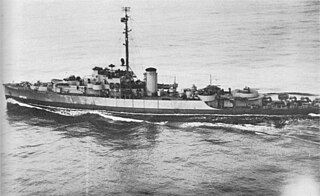 W
WUSS Gloucester (PF-22), a Tacoma-class frigate in commission from 1943 to 1945, was the second ship of the United States Navy to be named for Gloucester, Massachusetts. She later served in the Soviet Navy as EK-26 and in the Japan Maritime Self-Defense Force as JDS Tsuge (PF-12) and JDS Tsuge (PF-292).
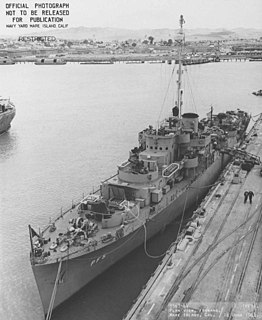 W
WUSS Hoquiam (PG-113/PF-5), a Tacoma-class patrol frigate in commission from 1944 to 1945 and from 1950 to 1951, she is the only ship of the United States Navy to be named for Hoquiam, Washington. She also served in the Soviet Navy as EK-13 and in the Republic of Korea Navy as ROKS Nae Tong (PF-65).
 W
WThe second USS Long Beach (PF-34) was a Tacoma-class frigate in commission from 1943 to 1945. She later served in the Soviet Navy as EK-2 and then in the Japan Maritime Self-Defense Force as Shii (PF-17) and Shii (PF-297) and YAS-44.
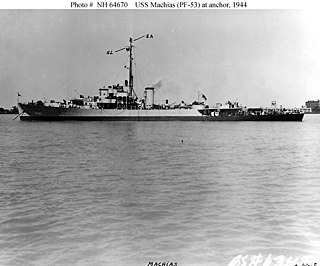 W
WThe second USS Machias (PF-53) was a United States Navy Tacoma-class frigate in commission from 1944 to 1945 which later served in the Soviet Navy as EK-4 and the Japan Maritime Self-Defense Force as JDS Nara (PF-2), JDS Nara (PF-282) and YTE-8.
 W
WUSS Measure (AM-263) was an Admirable-class minesweeper built for the United States Navy during World War II and in commission from 1944 to 1945. In 1945, she was transferred to the Soviet Union and served in the Soviet Navy from 1945 to 1947 as T-275. She later became the civilian whaling ship Buran ("Blizzard").
 W
WUSS Palisade (AM-270) was an Admirable-class minesweeper built for the United States Navy during World War II and in commission from 1944 to 1945. In 1945 she was transferred to the Soviet Union and served in the Soviet Navy after that as T-279.
 W
WUSS Pasco (PG-114/PF-6), a Tacoma-class patrol frigate in commission from 1944 to 1945, has thus far been the only ship of the United States Navy to be named for Pasco, Washington. She later served in the Soviet Navy as EK-12 and in the Japan Maritime Self-Defense Force as JDS Kashi (PF-3/PF-283) and as YAC-12.
 W
WUSS Rockford (PF-48), a Tacoma-class frigate in commission from 1944 to 1945, thus far has been the only ship of the United States Navy to be named for Rockford, Illinois. She later served in the Soviet Navy as EK-18 and in the Republic of Korea Navy as ROKS Apnokkang (62).
 W
WUSS San Pedro (PF-37), a Tacoma-class frigate in commission from 1943 to 1945, thus far has been the only ship of the United States Navy to be named for San Pedro, California. She later served in the Soviet Navy as EK-5 and in the Japan Maritime Self-Defense Force as Kaya (PF-8), Kaya (PF-288) and as YAC-23.
 W
WUSS Sandusky (PF-54), a Tacoma-class frigate in commission from 1944 to 1945, was the second United States Navy ship of the name and the first to be named for Sandusky, Ohio. She later served in the Soviet Navy as EK-7 and in the Japan Maritime Self-Defense Force as JDS Nire (PF-7), Nire (PF-287) and as YAC-19.
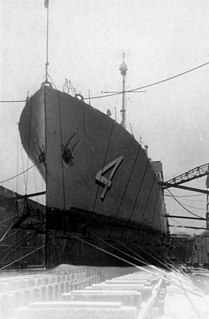 W
WUSS Sausalito (PF-4), was a Tacoma-class patrol frigate in commission from 1944 to 1945 and from 1950 to 1952, was the only ship of the United States Navy to be named for Sausalito, California. She also served in the Soviet Navy as EK-16 and in the Republic of Korea Navy as ROKS Imchin (PF-66).
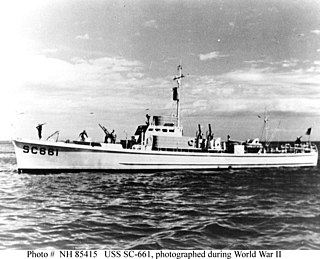 W
WU.S.S. SC-500 was a United States Navy SC-497 class submarine chaser in commission from 1942 to 1945 during World War II. She later served in the Soviet Navy as BO-319.
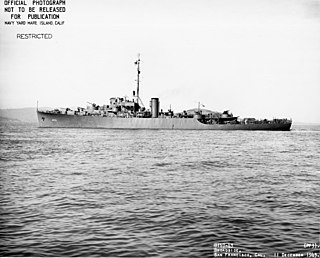 W
WUSS Tacoma (PG-111/PF-3), the lead ship of the Tacoma-class patrol frigates. The third ship of the United States Navy to be named for Tacoma, Washington, she was in commission from 1943 to 1945, and from 1949 to 1951. She also served in the Soviet Navy as EK-11 and in the Republic of Korea Navy as ROKS Taedong (PF-63).